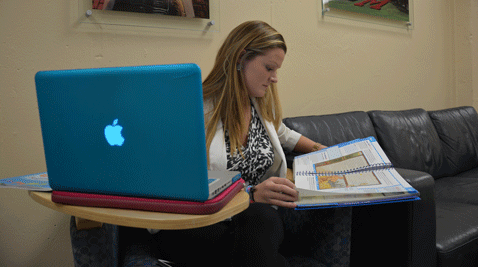ANNAPOLIS – With schools scrambling to implement the Common Core State Standards and legislators, officials and parents battling over the next steps, college students studying to be teachers have mixed feelings about entering the rocky terrain.
Common Core, a set of educational standards adopted by many states, was fully implemented across Maryland at the beginning of this school year and required many teachers to create new lesson plans and curriculums with little notice.

College students soon to enter the teaching world, however, still have time to be educated and adequately prepared.
“In order to be successful in the teaching world, I need to know about [Common Core],” said Erin Sullivan, 19, a sophomore at Towson University.
Kirby Buttry, 20, a junior at Salisbury University originally from Gaithersburg added: “As of now, looking at the curriculum, I’m fine with it. But if they change it, it’ll definitely take a while to get used to.”
Buttry’s concern of change is not without validation. Legislators have already started to weigh bills that would change a variety of factors about Common Core.
But students’ knowledge of the reform isn’t as universal as the standards itself.
“I’m hoping that as I get into my higher-level classes, they’ll be teaching me more and more about Common Core,” Sullivan, of Denton, said. She added, however, that she’d focused mostly on the history portion of her degree and had only taken a few education classes.
Sullivan isn’t alone in feeling unprepared.
“I haven’t been educated on it,” said Kayla O’Brien, 20, who is in her third year at Anne Arundel Community College. “I didn’t even know this whole thing was happening until this past semester.”
“I don’t feel prepared right now, because I only had one semester that brought it up,” O’Brien, who will transfer to University of Maryland, Baltimore County in the fall, continued. “I would hope my professors [there] would prepare us.”
O’Brien’s fears may be quelled, according to the university’s education professors.
“We know that the people that graduate this coming spring will be entering the classrooms and will be teaching Common Core,” said Eugene Schaffer, chairman of the University of Maryland, Baltimore County’s education department. “This is a great concern of ours.”
This concern is handled by requiring students to complete internships in the classroom under mentors who work closely with the university.
“When they’re [interning] for a full semester, they’re teaching the skills they have developed, and a lot of that is related to Common Core,” Schaffer said.
Prior to that practical experience, students prepare in their education classes.
“Methods courses have specific lessons geared toward explaining what Common Core is,” said associate professor John Singer, director of secondary education at the University of Maryland, Baltimore County. “They have three or four lesson plans they have to develop in connection to Common Core.”
Upperclassmen who have had both experiences express more confidence in entering the teaching world.
“Senior year does a fairly good job preparing us for Common Core,” said Lacey Smith, 22, a senior at University of Maryland, College Park, who is also student teaching at Hollywood Elementary school. “I’m more prepared than at the beginning of this year.”
Despite this, younger students are still nervous about the career field they will enter when considering pending legislation that would shake it.
“By the time I’m teaching I’m hopeful that it will have worked itself out,” Sullivan said. “I definitely think it would be easier if I were a sophomore five years from now.”
But ultimately, students recognize that new standards are typical for teachers.
“Teachers are always expected to change,” O’Brien, of Annapolis, said. “I realize that not everything is going to be set in stone all of the time. Something I’m working on professionally and personally is being resilient to change.”
With their limited experience in the classroom, the students are uncertain about their thoughts on the effectiveness and practicality of Common Core.
“It’s more real-world problem based,” Smith, of Frederick, the oldest of the students interviewed, said. “They are operating at a higher level than I was in fourth grade.”
O’Brien, however, said: “My gut feeling is that I don’t think [Common Core] is the best course of action. I don’t know how you expect every single student to learn the same way or to be held to the same standard.”
However, Sullivan, who “flew by” in high school said: “I came here to Towson and it was a wake-up call. [Common Core is] going to challenge students, which will help them in career and college prep.”


You must be logged in to post a comment.